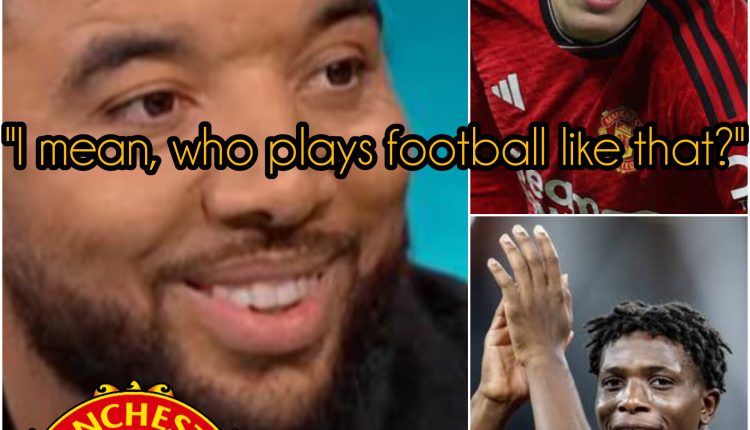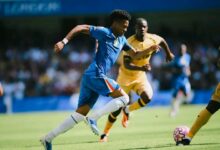Troy Deeney criticizes underperforming Manchester United player, saying he has the “first touch of an elephant” and calls his performance “terrible.”

Troy Deeney has shared his thoughts on Manchester United’s recent performance in the goalless Manchester derby, offering both praise and criticism. While he applauded Alejandro Garnacho for his lively display, he didn’t hold back when commenting on Patrick Dorgu’s contribution—particularly pointing out a heavy first touch that, in his words, was comparable to that of a “baby elephant.”
The match itself, played at Old Trafford, lacked the high energy and intensity typically expected from a derby between Manchester United and Manchester City. Despite that, it was United who looked more likely to break the deadlock, as they created a number of promising opportunities but once again fell short due to poor finishing in front of goal.
One of the earliest chances fell to Garnacho, who nearly found himself one-on-one with the goalkeeper in the opening minute, only to be brought down just outside the box by City defender Ruben Dias. Later in the first half, Diogo Dalot delivered a precise cross into the area, picking out Garnacho perfectly. However, the Argentine seemed unsure whether to go for a header or a volley, ultimately doing neither and wasting the chance.
Although Garnacho’s decision-making in the final third left something to be desired, Deeney commended the young winger for embodying the tactical approach being instilled by manager Rúben Amorim. According to Deeney, Garnacho’s willingness to make runs behind the opposition’s backline and stretch the defense is exactly what the manager expects from players in that role.
Later in the game, Garnacho attempted to switch roles and create for his teammates. Operating from the right flank, he cut the ball back into the box for Dorgu, who had made a good run. However, Dorgu’s poor first touch let him down, and the opportunity to score vanished. Deeney was particularly critical of that moment, stating that the touch was extremely poor and not good enough for a player looking to make an impression at this level. He emphasized that to finish chances like that, a sharper technical response is required.
Despite his harsh critique, Deeney did acknowledge some progress. He noted that Dorgu and Garnacho appear to be forming a decent partnership on the left side of the pitch, something that could be promising for Manchester United moving forward—if both players can improve their execution in key moments.
Meanwhile, former Manchester United midfielder Paul Scholes also weighed in after the match, offering a surprisingly pessimistic prediction regarding the club’s young talents. Scholes speculated that the club may be considering the sale of Garnacho and fellow youngster Kobbie Mainoo at the end of the season. While he admitted he could be wrong, he expressed concern that letting go of players like Mainoo—who has been at the club since his early youth—would reflect poorly on United’s academy system. According to Scholes, selling academy graduates with proven potential undermines the whole purpose of developing homegrown talent.
In summary, while there were flashes of promise from individuals like Garnacho, the match highlighted ongoing issues with finishing and decision-making. Deeney’s comments reflect both optimism for what Garnacho brings to the table and frustration over missed opportunities, especially when it comes to rising players like Dorgu who are still finding their footing.
That’s a really layered take on the derby, and it captures a lot of the mixed emotions surrounding Manchester United’s current state—especially with young talents like Garnacho, Dorgu, and Mainoo under the microscope.
### Key Takeaways:
**1. Garnacho’s Development Curve:**
– Troy Deeney’s praise for Garnacho feels spot-on—he’s showing maturity in his movement and tactical discipline under Rúben Amorim, especially with those aggressive runs in behind.
– That said, his inconsistency in finishing and final decision-making (like that wasted Dalot cross) remains a barrier between him being *electric* and *elite*.
**2. Dorgu’s Harsh Lesson:**
– Deeney’s “baby elephant” comment about Dorgu’s touch might sting, but it underscores how brutal the margin for error is at this level.
– Dorgu’s positioning and run were promising—it’s the execution that faltered. Still, those moments are vital learning curves for a young player trying to cement his place.
**3. Deeney’s and Scholes’ Contrasting Lenses:**
– Where Deeney sees potential and tactical buy-in, **Scholes voices a deep concern about United’s direction**, especially the idea that Garnacho and Mainoo could be sold.
– If true, that would point to a financial-first rebuild model that undermines United’s traditional identity of trusting youth.
**4. The Amorim Factor:**
– One thing that’s increasingly clear is Amorim’s tactical system is getting through to players like Garnacho. There’s structure in United’s play, even if the final third remains chaotic.
– Dorgu and Garnacho developing a left-sided partnership is something to watch—if they refine their chemistry, it could become a real asset.
—
### Bottom Line:
The derby was a **missed opportunity**, but it also gave a glimpse into where United is heading under Amorim—**structured, youth-driven, and high-pressing**. However, the growing pressure to raise funds could see the club making controversial sales that clash with their identity.
Would you personally be in favor of selling someone like Garnacho or Mainoo if it meant unlocking a bigger signing—or is that a line United should never cross?








